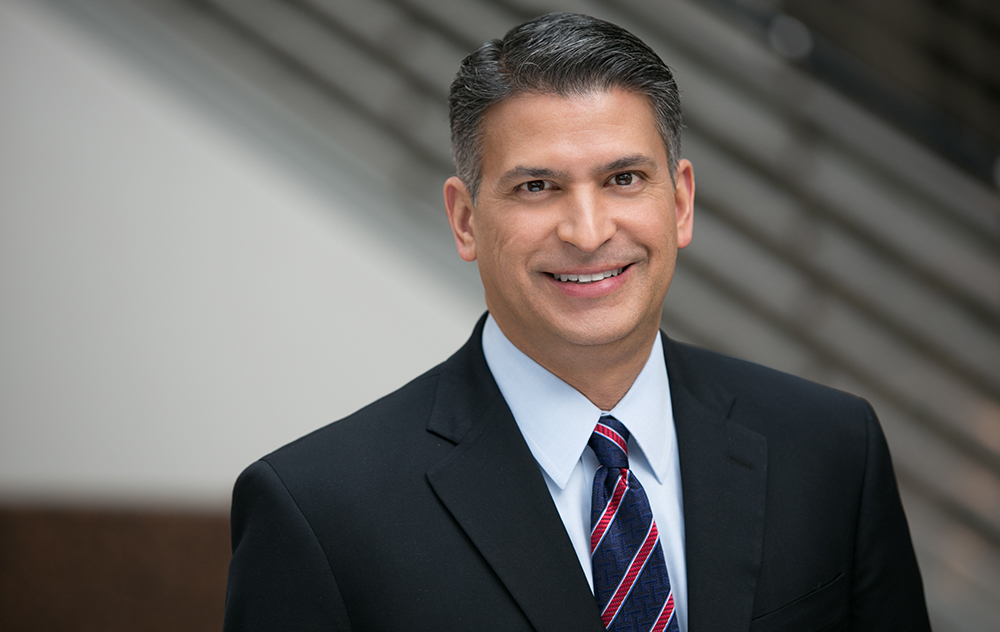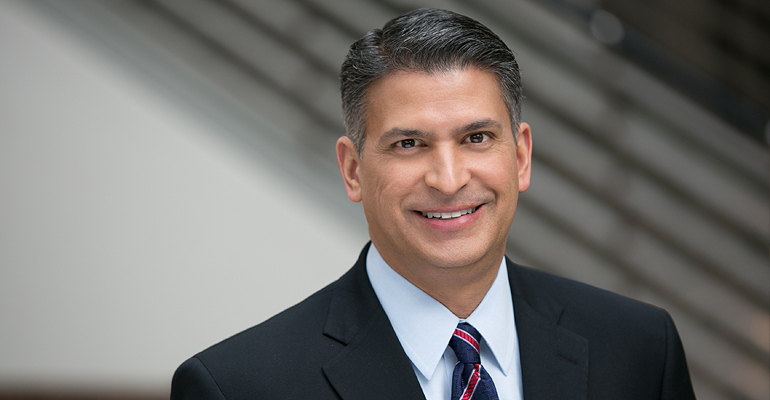
Two-time College of Business graduate Jose Tomas began his rise to human resource leadership working at Publix Super Markets in Miami. Over the next 20 years he held top-level positions in the healthcare, food service and transportation and logistics industries.
On July 1, 2017 Tomas became the senior vice president of global human resources at General Motors. He reports to GM’s CEO Mary Barra and serves on the automaker’s senior leadership team.
“I had read quite a bit about the transformation going on here [at GM], and I wanted to be part of it,” said Tomas (BBA ’92, MSHRM ‘03), who oversees human resources for all of GM. “It’s the biggest challenge I’ve had from a career standpoint.”
He describes GM and its employees as truly global.
“While walking down the halls you meet very diverse team members that have moved through multinational assignments,” said Tomas. “I’m part of a team that’s focused on competing globally.”
Tomas remembers the early days, when he began bagging groceries at Publix blocks away from his high school and later while at FIU. He stayed with Publix for 17 years, the first eight in operations followed by a run as manager and later in human resources.
When it came to selecting a college, Tomas said FIU was the right choice for him at both the undergraduate and graduate levels.
“FIU has many course options and it was a natural segue for someone like me who was working full time,” he added. “When I was in graduate school I was a human resource practitioner handling day-to-day work, and at FIU I recognized the value of research in the application of human resource management.”
After Publix, Tomas worked at Ryder System for five years. In 2004 he joined Burger King following its purchase by Diageo and remained as the company shifted between public and private ownership multiple times, most recently with 3G Capital. Concurrently, Tomas served as president of Burger King’s Latin American and Caribbean operations, leading 1,400 restaurants in 30 countries.
In 2012 he joined health insurance provider Anthem Inc. as executive vice president and chief human resource officer, leading human resources, corporate communications and security.
“I’ve been able to evolve over the course of my career and learned to be flexible based on the needs of the organization,” Tomas noted.
Throughout his career, Tomas has maintained close ties to FIU’s College of Business and was involved with the Chapman School’s Master of Science in Human Resource Management (MSHRM) Advisory Board for several years and later with the Healthcare MBA Advisory Board.
While at Burger King he established a management trainee program for undergraduate and graduate students, where they worked four months inside a restaurant and later at the corporate headquarters. Many were FIU students.
“The students at FIU are ambitious and want to succeed,” said Tomas. “As a business leader, you tend to seek out employees whose drive translates into high performance.”
-
Where are you from originally?
Not a Miami native, but I grew up in South Florida. I was born in Puerto Rico while my parents were working in St. Thomas, USVI and lived there for seven years then four in the Dominican Republic. I arrived in Miami, with my parents and three brothers, in the 6th grade and have lived here since.
-
Did you always want to study business?
I knew I wanted to major in business, but I wasn’t sure what discipline to pursue. It wasn’t until my senior year at FIU that I knew that HR was the right one.
-
How did your FIU experience and degrees prepare you for a career and leadership in human resources?
At FIU I learned that even as an operator, whether inside a grocery store or running Latin America and Caribbean operations for Burger King, to always identify people and culture as the significant differentiators for driving performance.
-
What advice would you give FIU students today?
Learn to compete globally. Miami is a wonderful city and the weather is difficult to leave behind, but do not limit your potential. I can see why it may be difficult to leave Miami after FIU. Nonetheless, engage in a broader way and leverage the school’s global platform to your advantage.
-
Looking back on your time at FIU, what was your favorite class?
My favorite was leadership development. They included quite a bit of theory applied around employee engagement. These were topics that companies weren’t talking about 15 years ago. It gave me an appreciation for the academic view that traditional human resource practitioners forget. It’s easy to get stuck on the day-to-day operations and not recognize the academic and strategic values.
-
As an alumnus, how have you seen FIU’s influence expand beyond South Florida?
A few years ago you didn’t see many FIU graduates outside of South Florida. Today, I’m seeing more of them in other cities. There seems to be a greater appetite for recent graduates to leave South Florida.
-
How does FIU benefit from having more alumni branch out and gain career experience outside of South Florida?
Brand recognition. A lot of folks beyond the boundaries of South Florida don’t know how prominent FIU is, in part because it’s still a young university. The recognition [outside Florida] has been a long time coming.
-
When you joined Anthem in Indianapolis, what were the challenges and rewards of taking a position away from South Florida?
The reality is that South Florida has a limited number of large employers and I worked for two of the largest, Burger King and Ryder. I knew that I would have to leave Miami if I wanted to work for a larger company. Anthem is a Fortune 50 employer.
-
How was life in Indianapolis?
The transition was not difficult from a work location standpoint, it was more from a family standpoint – I spent three-and-a-half years flying back and forth while my family stayed in Miami. The city and the people were great; you see true Midwestern values. I only had to get used to no one using their car horn as much as in Miami. I had a cafetera in my apartment and packed or shipped cans of Cuban coffee.





